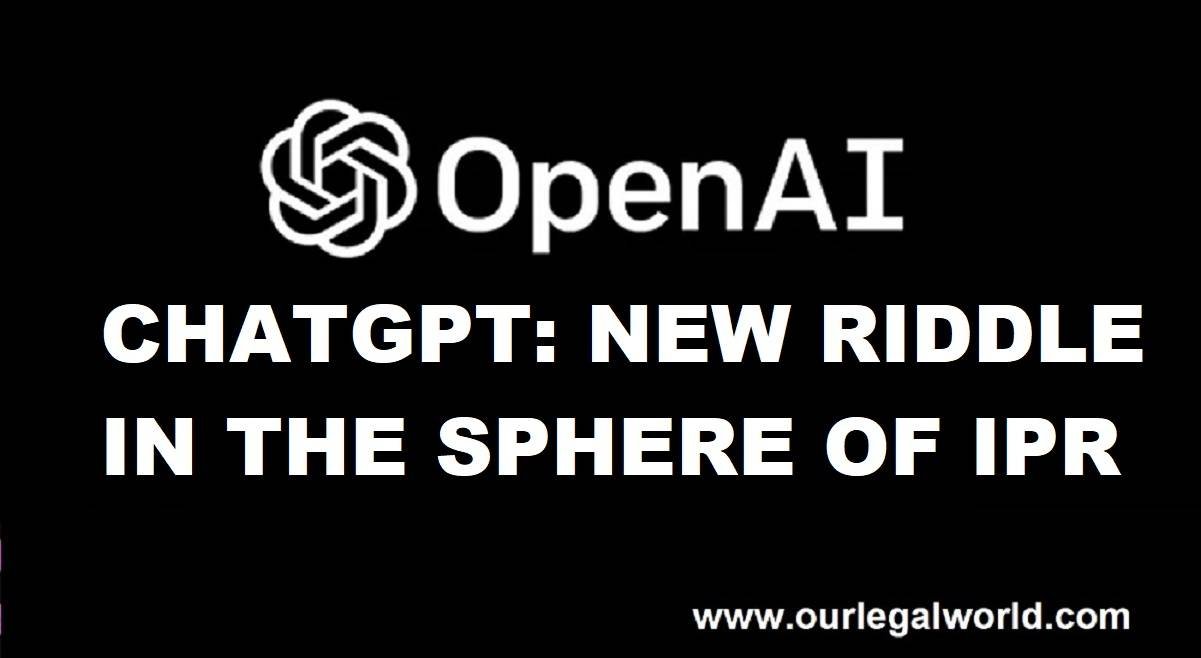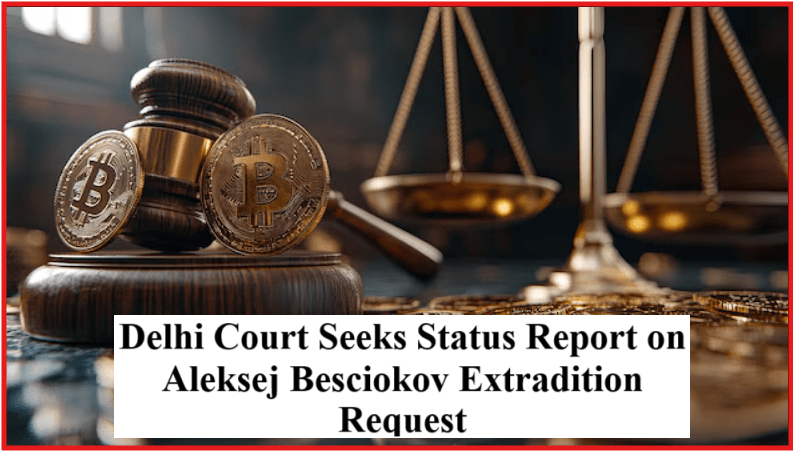CHATGPT: NEW RIDDLE IN THE SPHERE OF IPR
INTRODUCTION
A new reawakening in the world of Artificial Intelligence surfaced with the release of the supernova bot Chat Generative Pre-Trained Transformer, ordinarily known as ChatGPT. Unlike previous bots to aid humans with lucid texting, this leap involves tools to write a composition in a fraction of a second. This new generation bot can antipode, generate legible documents, and can even produce novel images or videos on individual manifested demands. It serves as a genie to anyone with a wish to devise diverse genera of subject matter in the most human way possible, but the question arises about the maintainability of Intellectual Property Rights. The conundrum is the validity of such AI-driven content in the sphere of IPR.
ChatGPT
Open AI launched this megahit bot in November 2022. Since then, it has been gaining attention for its uneven factual accuracy. When it boils down to the working of ChatGPT, it uses a neural network to create an illusion of human-developed speech. A neutral network is an algorithm that functions in the parallel format as neurons in the human brain. It is plotted out for the surreal effect of interactive conversations as is done by the human brain. ChatGPT is upskilled to aid the assistance of actual human directives, this makes the chatbot find patterns, and the world works humanly. It takes in as much human-derived input as possible in the presence of the internet these days it’s not much of a task to find original human maneuver. Then it presents the content gathered in the way an ordinary human would. All such human attributes and their mechanisms are scrutinized by the system and the info available is put forward in a soulful manner.
It is structured in a way that will aid humans with natural replies concerning any query whatsoever. From writing code to planning a birthday party, it functions in a personified manner. It works as a charm for curating assignments and is capable of unfastening human effort for any task, which not only involves tapping into encyclopedia knowledge and a vast sea of vocabulary but the presentation reflects personalized speech patterns that make it impossible to differentiate if the content is a human-made effort or was it out-turn of an AI production.
IPR PERSPECTIVE
The laws of IPR are structured to protect intangibly existing rights, specifically the copyright aspect of IPR deals with original literary material. When speculating the new invention, a series of questions pop up to which there exists no certain rejoinder. It all starts with the probe of who will ultimately be considered as the principal originator, will it be the bot itself, the engineer behind the bot, or the person who created the original content from which the newly made material was produced? And by and by, if the bot is enthroned as the ultimate creator, is it even possible to empower an artificially curated mechanism as the originator? Another key issue in the picture is if this content is even capable of being covered under the current IP regime, and will then a follow-up of infringement ever is possible for such vague data.
Addressing the primary dilemma in the field of IP, as to who will be considered the principal originator of the content created by the ChatGPT. The domain of copyright inoculates the rights of creators of original literary and artistic works from being replicated or plagiarized, but for shielding these rights it is expedient to comprehend the pioneer of the data. In the given case there exists unfamiliarity in the quarter of “original creator”. It is an enigma whether the bot itself or the mastermind behind the development of such a bot will be appraised as the creator.
Chatbots while dispensing queries, interpret what one is looking for and then curate a human-like conversation and intelligent replies. Usually, while pastoring such interpretations, they stockpile info from an abundant source of data available over the internet and after intermixing such data handouts a specially cataloged response. Scrutinization will reveal that the ultimate source of data taken into account is initially covered under the blanket of copyright, so can be affirmed as infringement. But, after such thorough shuffling and incorporation of stimulus to activate human element in the responses it becomes impossible to pin down such infringement. And with the growing technology, the job seems to be getting more burdensome.
In addition to the identification of the forged material, it is primary that the copyright act entails provisions for such infringement by AI. Section 51 of the copyright act talks about the infringement of a such right and lays down “grounds for infringement by any person”. This section does not take into account any sort of infringement done by anyone but human, and since AI is not covered under the roof of “person” it cannot be liable for infringement. Thus, goes away the opportunity to block any swaying away of copyrighted content by ChatGPT.
Now that the contemporary material has been created by the ChatGPT the succeeding question is regarding the copyrightability of the text and the authorship. The Copyright Act defines the first owner of the copyright under Section 17 that the author of the work shall be the owner of the copyright. Since the assembling of the data is done by ChatGPT which is authored by a person then the handle to it can also be titled to them. In cases where work is created along with abundant human interference and qualifies the test of originality, then authorship can be claimed by the owner. Considering ChatGPT, although the functioning algorithm is executed by a human the further functioning is in no context associated with the creator of the program. With the rooted use of natural language processing and accumulating results from a massive amount of data strolling and compiling, the creator of such a bot can be excluded from being the originator of such text.
The engineer of the content in question is ultimately ChatGPT. The Copyright Act recognizes literary compilations as copyrightable and since ChatGPT functions on the lines of the compilation of pre-existing data, it might get covered under the blanket of IPR. Despite that, the compilation method used by ChatGPT does not append any skill or judgment it is merely the algorithm that engenders the final output.
Hon’ble Supreme Court in the judgment of Eastern Book Company vs D.B. Modak observed that “To claim copyright in a compilation, the author must produce the material with the exercise of his skill and judgment which may not be created in the sense that it is novel or non-obvious, but at the same time it is not a product of merely labor and capital.” So even though the compilation of pre-existing data will lead to copyrightable material, it does mandate certain skills or personal judgment, and since the bot fails to fulfill all the checks to the list, the title of authorship to the bot comes under jeopardy.
Also Read: Copyright conundrum: copyright ownership by non-human entities
The controversy about the principal originator still stands unsettled. And the answer about the copyrightability of such produced content falls in the grey area. Our IP regime falls short of answering queries that come up with the developing technology. With the growing routine of ChatGPT, the speculation is it will soon replace human programmers and anthropoid content creation. With such a swap it becomes indispensable to bring IPR into the frame and address the above issues.
CONCLUSION
There seize to exist a lot of ambiguity and vagueness deemed to the authenticity and protectability of the content produced. Even the supernova answered shillyshally when questioned about the copyrightability of its produced content. It went like “ChatGPT is a powerful tool that has the potential to produce some truly impressive content, the question of its copyright eligibility is a complex one. It’s ultimately up to courts and legal experts to determine whether or not ChatGPT’s output can be protected under copyright law.” The AI concludes the pronouncement of the IP influence over the matter in the hands of the legislature, in the meantime, it indicates a level of caution concerning the potential legal implications of the AI-generated content. Our current IP regime is severely lacking instruments to salvage the issues related to immensely growing AI technology such as ChatGPT. To dispense with the stumbling block a lot of amendments and clarifications will have to be trailed. ChatGPT might succeed humans, but the success of ChatGPT must be synchronized by humans.








